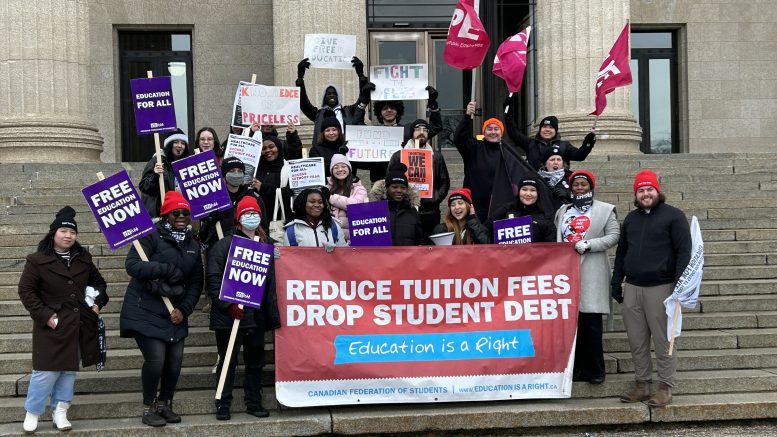The Canadian Federation of Students held a series of rallies on Nov. 8 advocating for free and accessible education throughout the country, including one in Winnipeg, as part of its national day of action.
A crowd of over a dozen gathered on the steps of the Manitoba legislative building to present their demands, which included free and accessible education, fair treatment of international and Indigenous students and more grants for graduate students, rather than loans.
National deputy chair for the Canadian Federation of Students Natalia Tola said that with a housing crisis, inflation and rising costs of education, “it’s just not feasible for students to be able to go to school now.”
“It’s a moral question of whether people deserve education or not and the answer is yes,” she said.
Rallies were also held in Halifax, St. John’s, Regina, Surrey, Toronto, Ottawa and throughout Ontario.
Tola said “one of the biggest issues” the federation was hoping to address is education costs for international students. Across Canada, international students pay an average of five times as much in tuition as domestic students.
“Especially thinking about the great contributions that international students bring, it’s important that we value and we retain these students and we don’t price them out of their education,” Tola said.
She pointed out that international students contribute over $22 billion to Canada’s economy.
Tola said she expects the newly elected Manitoba New Democratic Party government to be receptive to the federation’s concerns.
She noted that the federation’s representatives had met with Minister of Advanced Education and Training Renée Cable two days before the rally. Tola believes they share mutual goals, including reinstating international students’ health care after the previous Manitoba Progressive Conservative government revoked free access for students from abroad.
Cable said she also thought the meetings with the federation have gone well so far, pointing to discussions concerning access to student aid and grants. She also said she has had “many discussions” with Minister of Health, Seniors and Long-Term Care Uzoma Asagwara regarding reinstating international students’ health care, although she was not able to offer a timeline for when the policy would be implemented.
Victoria Romero, a fourth-year political studies and history student and one of the speakers at the rally, told the crowd how her own struggles with affordability have interfered with her education.
When she completes her undergraduate degree, Romero hopes to continue her education in law school or seek a PhD and aspires to work in academia or legal consultation. She will not be able to proceed with her plans immediately due to costs, however.
Romero told the Manitoban that her neurodivergence makes it difficult for her to balance education, mental health and working enough to afford classes. She worries about taking on debt “without the guarantee of having a job” when she graduates.
“I had been under the impression that I would be able to afford my education and be able to enter into grad school immediately upon graduating from my undergrad,” Romero said.
She said her challenges with balancing disability with work and education led her to add a few years to her degree, which also increased the cost.
“Now I’m at the point where I’m having to accept the fact that I will not be able to go on to do my graduate studies next fall when I graduate in the spring,” she said.
Romero worries that once she enters the workforce she will never “be afforded the time and the opportunity to go back to a space where [she] can focus fully on learning.”
Marie Paule Ehoussou, the chairperson of Canadian Federation of Students Manitoba, said that while the federation’s ultimate goal is access to free, high quality post-secondary education, this is “not something that’s going to happen overnight.”
“We make it more affordable to start with, by giving more grants, more scholarships and less loans to students and then building up on that and eventually letting students have access to free education across Canada,” she said.
When asked whether she supported free tuition, Cable said that her “mandate is to support students” and make their lives more affordable. She pointed to her own experience needing financial assistance to complete her education.
“What I want to do is ensure that we get as many people as possible through post-secondary, that as many students as possible know that there is a place for them in post-secondary,” she said.
In her speech to the crowd gathered at the legislature, Romero said that universities with rising tuition and fees are “not the education system we deserve.”
“No one should ever have to make the heart-wrenching choice between putting food on the table and keeping a roof over their head, and purchasing textbooks and attending classes,” she said.
“It is not a choice, it’s a systemic injustice.”
She said “education should empower us, not enslave us,” and that the rally was not just for students struggling to afford their studies.
“This fight is for every individual who will never even have the chance to dream of university-level education because they know they can never afford it,” Romero said.


